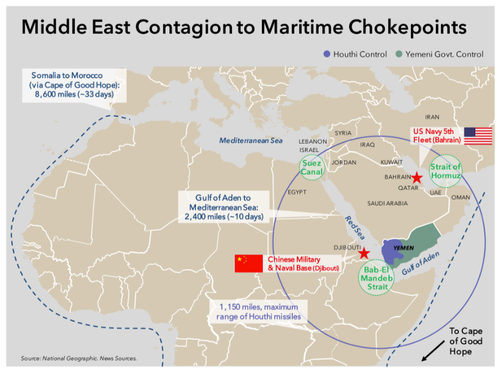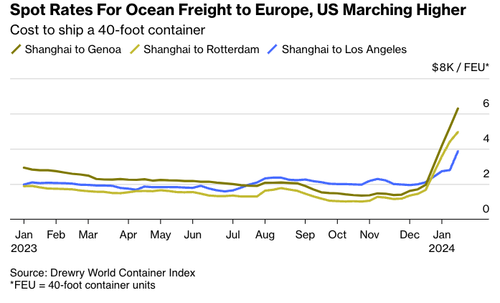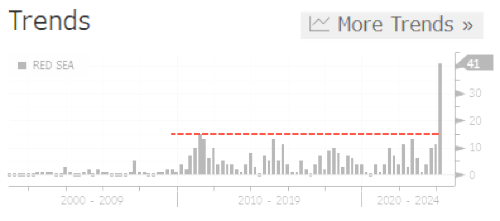
Update(1657ET): It didn't take long for the Pentagon to smack down Houthi claims, also in the absence of any specific evidence...
#BREAKING: US Navy smacks down Houthi claim to have hit an American ship. https://t.co/wMO3mMww7Q
— Jokerman Intel (@JokermanIntel) January 24, 2024
* * *
Update(1621ET): Yemen's Houthis have issued a statement claiming that the earlier attack on a US-flagged Maersk vessel near the Red Sea actually hit the US ship. The Houthi military statement further praised the operation as a success, given the Maersk vessel and accompanying warships were "forced to withdraw" from their path entering the Red Sea.
"Several of our ballistic missiles struck their targets despite warships' attempts to intercept them," the new statement claims. However, the Houthis have not offered any proof, such as photographic evidence collected by drone footage. Also, the earlier Pentagon statement asserted there was no damage to crew or ship, and that it wasn't hit. US CENTCOM had said one missile fell into the sea, while others were intercepted by the warship USS Gravely. The Houthis have been caught lying about or exaggerating the results of their operations. But of course, the Pentagon has incentive to suppress the potential that an American vessel was hit, given that it would mean the significant US Navy escort utterly failed.
#BREAKING: Houthis release statement claiming without evidence to have hit an American vessel in the Red Sea. pic.twitter.com/3AiHIb6kzz
— Jokerman Intel (@JokermanIntel) January 24, 2024
* * *
Update(1446ET): US Central Command has confirmed the attack incident on the US container ship, but has provided further key details saying that one of the no less than three Navy warships accompanying the US-flagged Maersk vessel intercepted most of the inbound anti-ship missiles fired from Yemen:
The US Central Command has said that the Houthis launched three anti-ship ballistic missiles at a US-flagged container ship off the coast of Yemen earlier on Wednesday.
“One missile impacted in the sea. The two other missiles were successfully engaged and shot down by the USS Gravely (DDG 107),” CENTCOM said in a statement. “There were no reported injuries or damage to the ship.”
The fact that the Houthis launched the missiles despite the presence of a warship group is a testament to the fact that the Western naval coalition has not served as an effective deterrent.
This afternoon Houthis fired 3 anti-ship ballistic missiles from Yemen toward 🇺🇸US owned container ship MV Maersk Detroit in the Gulf of Aden.
— Navy Lookout (@NavyLookout) January 24, 2024
One missile impacted in the sea. The two other missiles were successfully shot down by USS Gravely.
(Library Images) pic.twitter.com/LnGKHW2nRq
* * *
Update(11:30ET): As we previously noted, earlier in the morning Sky News reported that Houthi forces fired at least two missiles from Al-Bayda towards the Gulf of Aden. Well, it seems they were targeting a US vessel, even despite it having a US Naval escort. Per the breaking details in Bloomberg:
Two Maersk vessels were targeted in attacks near the Red Sea on Wednesday, ShippingWatch reports, citing the Danish shipping company. The vessels, which belong to Maersk’s US subsidiary Maersk Line Ltd., were headed for the Bab el-Mandeb Strait, escorted by the US Navy, news website says.
ShippingWatch indicated that as a result of the attack, wherein all the crew and ships were unscathed, the ships have turned around. Maersk starting in early January suspended transit for all its ships, but the directive did not apply to its US subsidiary.
This fresh incident is hugely significant given that after some eight or more rounds of US missile attacks and airstrikes on Houthi positions, the Iran-linked group remains undeterred, even with a US Navy escort seeking to protect an American container vessel.
* * *
Two months of drone and missile attacks on commercial vessels, as well as hijackings, in the highly contested Red Sea region by Iran-backed Houthi rebels, have yet to abate as economic costs mount for shippers and increased risks of snarled global supply chains.
The latest evidence that Red Sea disruptions will persist is a notice from the Department of Transportation informing commercial ship operators to avoid the "Southern Red Sea between 12N and 16N."
There continues to be a high degree of risk to commercial vessels transiting the Southern Red Sea between 12N and 16N. While the decision to transit remains at the discretion of individual vessels and companies, it is recommended that US flag and US-owned commercial vessels remain North of 18N in the Red Sea or East of 46E in the Gulf of Aden until further notice.
Besides Houthi attacks on Western vessels, the US and allies have ramped up attacks on the rebels in Yemen with repeated airstrikes.
Bloomberg reported early Wednesday that one of the world's largest shippers, Maersk, told clients in a notice to prepare for supply line disruptions as containerized vessels are rerouted to the Cape of Good Hope, which takes an extra 1-2 weeks for Asia to Europe shipping lanes.
"While we continue to hope for a sustainable resolution in the near-future and do all we can to contribute towards it, the situation currently remains untenable," Maersk said.
According to Flexport data, more than 500 container ships that would have sailed through the Red Sea have been rerouted to the Cape of Good Hope at the southern tip of Africa. This is about a quarter of all the container shipping capacity in the world.
Meanwhile, a new report from the Financial Times, citing "American officials," says the US has asked China to help rein in Houthi rebels.
Officials have repeatedly raised the matter with top Chinese officials in the past three months, asking them to convey a warning to Iran not to inflame tensions in the Middle East after Hamas's October 7 attack on Israel and the ensuing war.
US national security adviser Jake Sullivan and his deputy, Jon Finer, discussed the issue in meetings this month in Washington with Liu Jianchao, head of the Chinese Communist party's international department, according to US officials. Secretary of state Antony Blinken also raised it, said a state department official. -FT
In recent weeks, Red Sea diversions have tightened capacity and resulted in soaring container prices:
"We haven't seen costs increase this quickly since the last crunch in the pandemic," said Vincent Iacopella, a logistics expert at Alba Wheels Up, who spoke with Bloomberg.
Iacopella said, "Many of the underlying bottlenecks in supply chains remain, even though prices dropped last year as the Covid-19 disruptions faded.
The cost of shipping containers from China to the Mediterranean Sea has quadrupled since late November.
We pointed out last week that executives and investors are becoming concerned about Red Sea disruptions in earnings calls.
Using the Document Search function on Bloomberg, earnings-call mentions of "Red Sea" topped 41 last week, a record high. As the earning season progresses, the mentions will likely increase.
And as of writing this note, Sky News reports Houthi forces "fire a second missile from Al-Bayda towards the Gulf of Aden."
President Biden's Operation Prosperity Guardian faces severe hurdles as the West's move to secure the critical waterway has failed so far.
Update(1657ET): It didn’t take long for the Pentagon to smack down Houthi claims, also in the absence of any specific evidence…
#BREAKING: US Navy smacks down Houthi claim to have hit an American ship. https://t.co/wMO3mMww7Q
— Jokerman Intel (@JokermanIntel) January 24, 2024
* * *
Update(1621ET): Yemen’s Houthis have issued a statement claiming that the earlier attack on a US-flagged Maersk vessel near the Red Sea actually hit the US ship. The Houthi military statement further praised the operation as a success, given the Maersk vessel and accompanying warships were “forced to withdraw” from their path entering the Red Sea.
“Several of our ballistic missiles struck their targets despite warships’ attempts to intercept them,” the new statement claims. However, the Houthis have not offered any proof, such as photographic evidence collected by drone footage. Also, the earlier Pentagon statement asserted there was no damage to crew or ship, and that it wasn’t hit. US CENTCOM had said one missile fell into the sea, while others were intercepted by the warship USS Gravely. The Houthis have been caught lying about or exaggerating the results of their operations. But of course, the Pentagon has incentive to suppress the potential that an American vessel was hit, given that it would mean the significant US Navy escort utterly failed.
#BREAKING: Houthis release statement claiming without evidence to have hit an American vessel in the Red Sea. pic.twitter.com/3AiHIb6kzz
— Jokerman Intel (@JokermanIntel) January 24, 2024
* * *
Update(1446ET): US Central Command has confirmed the attack incident on the US container ship, but has provided further key details saying that one of the no less than three Navy warships accompanying the US-flagged Maersk vessel intercepted most of the inbound anti-ship missiles fired from Yemen:
The US Central Command has said that the Houthis launched three anti-ship ballistic missiles at a US-flagged container ship off the coast of Yemen earlier on Wednesday.
“One missile impacted in the sea. The two other missiles were successfully engaged and shot down by the USS Gravely (DDG 107),” CENTCOM said in a statement. “There were no reported injuries or damage to the ship.”
The fact that the Houthis launched the missiles despite the presence of a warship group is a testament to the fact that the Western naval coalition has not served as an effective deterrent.
This afternoon Houthis fired 3 anti-ship ballistic missiles from Yemen toward 🇺🇸US owned container ship MV Maersk Detroit in the Gulf of Aden.
One missile impacted in the sea. The two other missiles were successfully shot down by USS Gravely.
(Library Images) pic.twitter.com/LnGKHW2nRq
— Navy Lookout (@NavyLookout) January 24, 2024
* * *
Update(11:30ET): As we previously noted, earlier in the morning Sky News reported that Houthi forces fired at least two missiles from Al-Bayda towards the Gulf of Aden. Well, it seems they were targeting a US vessel, even despite it having a US Naval escort. Per the breaking details in Bloomberg:
Two Maersk vessels were targeted in attacks near the Red Sea on Wednesday, ShippingWatch reports, citing the Danish shipping company. The vessels, which belong to Maersk’s US subsidiary Maersk Line Ltd., were headed for the Bab el-Mandeb Strait, escorted by the US Navy, news website says.
ShippingWatch indicated that as a result of the attack, wherein all the crew and ships were unscathed, the ships have turned around. Maersk starting in early January suspended transit for all its ships, but the directive did not apply to its US subsidiary.
This fresh incident is hugely significant given that after some eight or more rounds of US missile attacks and airstrikes on Houthi positions, the Iran-linked group remains undeterred, even with a US Navy escort seeking to protect an American container vessel.
* * *
Two months of drone and missile attacks on commercial vessels, as well as hijackings, in the highly contested Red Sea region by Iran-backed Houthi rebels, have yet to abate as economic costs mount for shippers and increased risks of snarled global supply chains.
The latest evidence that Red Sea disruptions will persist is a notice from the Department of Transportation informing commercial ship operators to avoid the “Southern Red Sea between 12N and 16N.”
There continues to be a high degree of risk to commercial vessels transiting the Southern Red Sea between 12N and 16N. While the decision to transit remains at the discretion of individual vessels and companies, it is recommended that US flag and US-owned commercial vessels remain North of 18N in the Red Sea or East of 46E in the Gulf of Aden until further notice.
Besides Houthi attacks on Western vessels, the US and allies have ramped up attacks on the rebels in Yemen with repeated airstrikes.
Bloomberg reported early Wednesday that one of the world’s largest shippers, Maersk, told clients in a notice to prepare for supply line disruptions as containerized vessels are rerouted to the Cape of Good Hope, which takes an extra 1-2 weeks for Asia to Europe shipping lanes.
“While we continue to hope for a sustainable resolution in the near-future and do all we can to contribute towards it, the situation currently remains untenable,” Maersk said.
According to Flexport data, more than 500 container ships that would have sailed through the Red Sea have been rerouted to the Cape of Good Hope at the southern tip of Africa. This is about a quarter of all the container shipping capacity in the world.
Meanwhile, a new report from the Financial Times, citing “American officials,” says the US has asked China to help rein in Houthi rebels.
Officials have repeatedly raised the matter with top Chinese officials in the past three months, asking them to convey a warning to Iran not to inflame tensions in the Middle East after Hamas’s October 7 attack on Israel and the ensuing war.
US national security adviser Jake Sullivan and his deputy, Jon Finer, discussed the issue in meetings this month in Washington with Liu Jianchao, head of the Chinese Communist party’s international department, according to US officials. Secretary of state Antony Blinken also raised it, said a state department official. -FT
In recent weeks, Red Sea diversions have tightened capacity and resulted in soaring container prices:
“We haven’t seen costs increase this quickly since the last crunch in the pandemic,” said Vincent Iacopella, a logistics expert at Alba Wheels Up, who spoke with Bloomberg.
Iacopella said, “Many of the underlying bottlenecks in supply chains remain, even though prices dropped last year as the Covid-19 disruptions faded.
The cost of shipping containers from China to the Mediterranean Sea has quadrupled since late November.
We pointed out last week that executives and investors are becoming concerned about Red Sea disruptions in earnings calls.
Using the Document Search function on Bloomberg, earnings-call mentions of “Red Sea” topped 41 last week, a record high. As the earning season progresses, the mentions will likely increase.
And as of writing this note, Sky News reports Houthi forces “fire a second missile from Al-Bayda towards the Gulf of Aden.”
President Biden’s Operation Prosperity Guardian faces severe hurdles as the West’s move to secure the critical waterway has failed so far.
Loading…







